#ancientchristianity
Text
Join me in taking Hillsdale’s free online course, "Ancient Christianity": https://online.hillsdale.edu/landing/ancient-christianity?utm_source=housefile&utm_medium=referral&utm_campaign=ancientchristianity
5 notes
·
View notes
Text
On the eve of Lent…
2 notes
·
View notes
Photo
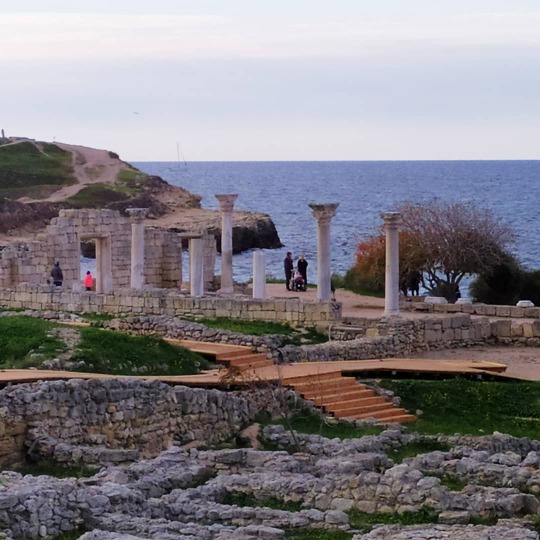
"Базилика 1935 г." (VI - X вв.), один из главных символов древнего города Херсонес Таврический. Посвящение храма неизвестно, поэтому он назван по году его открытия археологами. Колонны этой христианской церкви, запечатленные фотографами на фоне моря или голубого неба, часто призваны были создавать античный колорит. Стены храма покрывали фрески, реконструкции которых выставлены в Средневековом разделе Музея. Учеными высказывается, предположение о существовании в позднеантичный период на месте Базилики 1935 г. иудейского молитвенного дома - синагоги. / "1935 Basilica " (6 - 10 centuries), one of the main symbols of the ancient city of Tauric Chersonesos. The dedication of the temple is unknown, so it is named after the year of its discovery by archaeologists. The columns of this Christian church, captured by photographers against the background of the sea or blue sky, were often designed to create an antique flavor. The walls of the temple were covered with frescoes, reconstructions of which are exhibited in the Medieval section of the Museum. Scientists suggest the existence of a Jewish prayer house - a synagogue in the late antique period on the site of the 1935 Basilica. #Херсонес #СеверноеПричерноморье #Античность #ДревняяГреция #ДревнийРим #ПоздняяАнтичность #древнийгород #раннееХристианство #греки #Chersonesos #NorthBlackSeaCoast #Antiquity #AncientChristianity #AncientRome #LateAntiquity #AncientCity #Greece # ByzantineArt #daand_photo #daand_art #севастополь #Крым #историяКрыма #древнийМир #ГреческиеКолонии #Crimea #Bizance #Византия #базилика #археология #базилика1935 (at Севастополь, Крым) https://www.instagram.com/p/CISIG__JV59/?igshid=17n1qmt90kk8q
#херсонес#северноепричерноморье#античность#древняягреция#древнийрим#поздняяантичность#древнийгород#раннеехристианство#греки#chersonesos#northblackseacoast#antiquity#ancientchristianity#ancientrome#lateantiquity#ancientcity#greece#daand_photo#daand_art#севастополь#крым#историякрыма#древниймир#греческиеколонии#crimea#bizance#византия#базилика#археология#базилика1935
0 notes
Photo
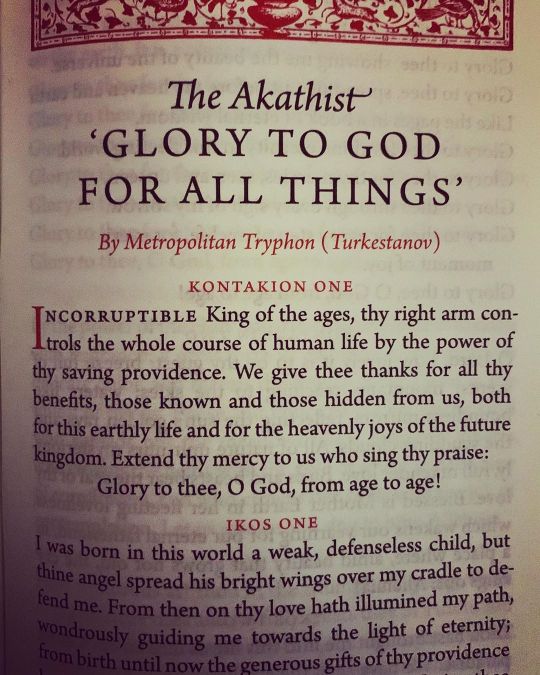
Glory to thee, treating pain and loss with the healing passage of time. Glory to thee, with whom there is no grief without hope, O Giver of life to all. Glory to thee, who hast made immortal all that is lofty and good and who dost promise us that longed-for meeting with those who have died. Glory to thee, O God, from age to age! #GloryToGodForAllThings #prayer #Christian #ancientchristianity #hope #love https://www.instagram.com/p/B97JUQTnURi/?igshid=k43ipafymok0
0 notes
Photo

Sciences and artistry that attempt to capture the esotericism of Christmas yield nothing but banalities and platitudes only found in the unfortunate commercialism culture has produced. Such human reasoning can never ask whether such exists as existence is beyond human reasoning. #christmastree #christmas #hermeticism #study #revolt #neotraditionalist #higherconsciousness #traditionalist #unlock #secretsoftheuniverse #unmovable #God #arithmetic #icon #calvinist #catholic #ancientchristianity #mystical #begininngless # (at Oregon) https://www.instagram.com/p/BrszPmrAOjv/?utm_source=ig_tumblr_share&igshid=5027r9c3xmnk
#christmastree#christmas#hermeticism#study#revolt#neotraditionalist#higherconsciousness#traditionalist#unlock#secretsoftheuniverse#unmovable#god#arithmetic#icon#calvinist#catholic#ancientchristianity#mystical#begininngless
0 notes
Photo
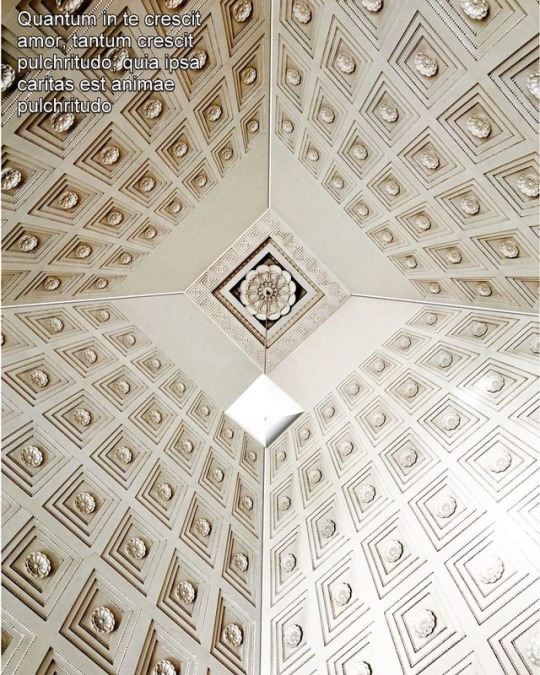
Ceiling inside the step pyramid of the southern wing of #NyCarlsbergGlyptotek in #Copenhagen --------------------- Quantum in te crescit amor, tantum crescit pulchritudo; quia ipsa caritas est animae pulchritudo (Sanctus Augustinus, epistulam Ioannis ad Parthos, tractatus IX, 9) Soviel in dir die Liebe wächst, soviel wächst die Schönheit in dir. Denn die Liebe ist die Schönheit der Seele. (Augustinus von Hippo) Beauty grows in you to the extent that love grows, because charity itself is the soul's beauty. (Augustine of Hippo) #augustineofhippo #sanctusaugustinus #churchfathers #catholictheologian #ancientchristianity #glyptoteket #glyptoteketcopenhagen #nycarlsbergglyptotek #classicalarchitecture #ceilings #stucco (her: Glyptoteket)
#churchfathers#ancientchristianity#stucco#glyptoteket#ceilings#classicalarchitecture#sanctusaugustinus#glyptoteketcopenhagen#catholictheologian#nycarlsbergglyptotek#copenhagen#augustineofhippo
0 notes
Video
youtube
Commentary on the Apocalypse of the Blessed John | St. Victorinus of Pettau | Christianity - Commentary | Audiobook full unabridged | English Content of the video and Sections beginning time (clickable) - Chapters of the audiobook: please see First comments under this video. This commentary is said to have been composed around 260, making it the earliest surviving commentary on Revelation. The author, St. Victorinus of Pettau (d. 303) flourished about 270, and was martyred during the Roman persecutions under Emperor Diocletian. The commentary does not cover every verse but focuses instead on key passages, giving mostly allegorical interpretations. He saw the Apocalypse as consisting of various subdivisions which run parallel with each other, the main theme of which is the coming Second Advent. - Summary by ancientchristian This is a Librivox recording. If you want to volunteer please visit https://librivox.org/ by Priceless Audiobooks
0 notes
Photo

Thanks for the kind words! ★★★★★ "Das warten hat sich gelohnt. Gute Karma Anhänger . Danke " Jana #etsy #ukraenie #starnecklace #starjewelry #pendantertsgamma #talisman #christiannecklace #ertsgammajewelry #ancientchristian #artefaktum_ua #jewelry #giftforhim #giftforher #etsysale #gift #necklaces #pendant
#gift#ukraenie#ertsgammajewelry#starnecklace#talisman#etsy#ancientchristian#artefaktum_ua#necklaces#pendantertsgamma#pendant#jewelry#starjewelry#christiannecklace#etsysale#giftforher#giftforhim
0 notes
Text
Icon, Saints&Reading: Tue., Apr., 27, 2021
April 14/27
Holy Apostles Aristarcus, Puden and Trophimus of the Seventy
All three are mentioned by name by the Apostle Paul.
Aristarchus is mentioned in Acts 19:29, Colossians 4:10 and Philemon 24. He was bishop of Apamea in Syria; St Paul calls him 'my fellow-prisoner' and 'my fellow-laborer'.
Pudens is mentioned in 2 Timothy 4:21. He was a prominent Roman citizen who gave refuge to Christians; his house was first a place of refuge for the Apostles, then one of the first churches in Rome.
Trophimus is mentioned with Pudens in 2 Timothy 4:21, and in Acts 21:29, where we learn that he was from Ephesus. He accompanied the Apostle Paul on some of his missions.
All three, like St Paul, were beheaded during Nero's persecutions.
Apostle Aristarchus of the seventy
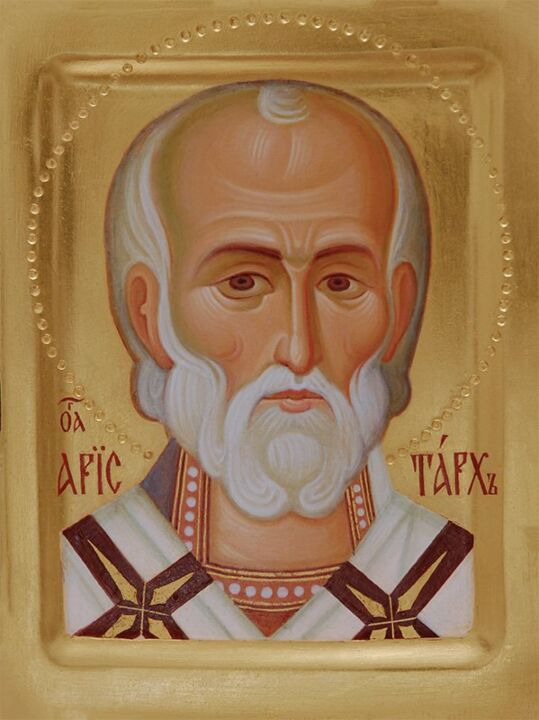
Apostle Trophimus of the seventy
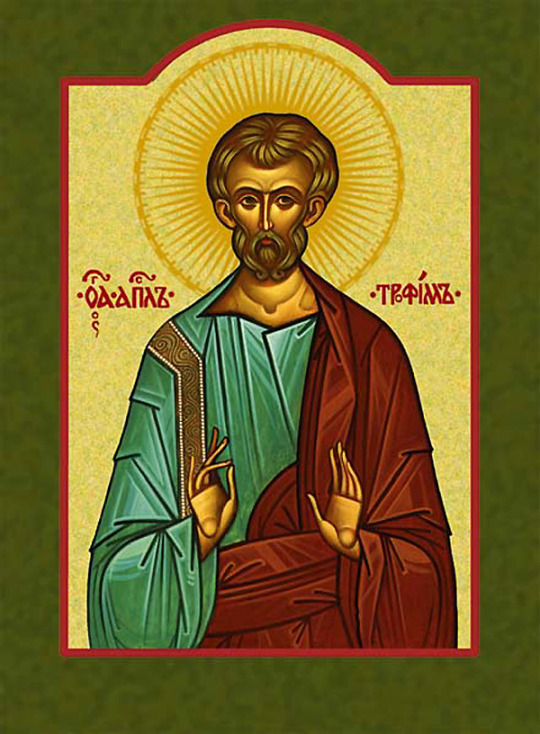
Apostles Aristarchus, Puden and Trophimus
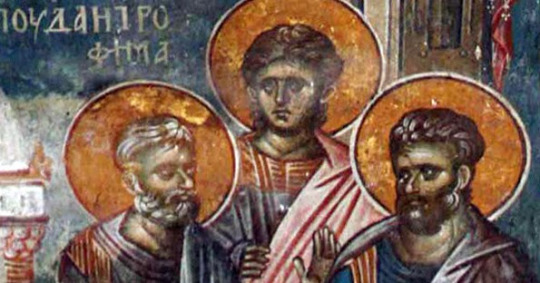
The Holy Martyr Ardalion (311)
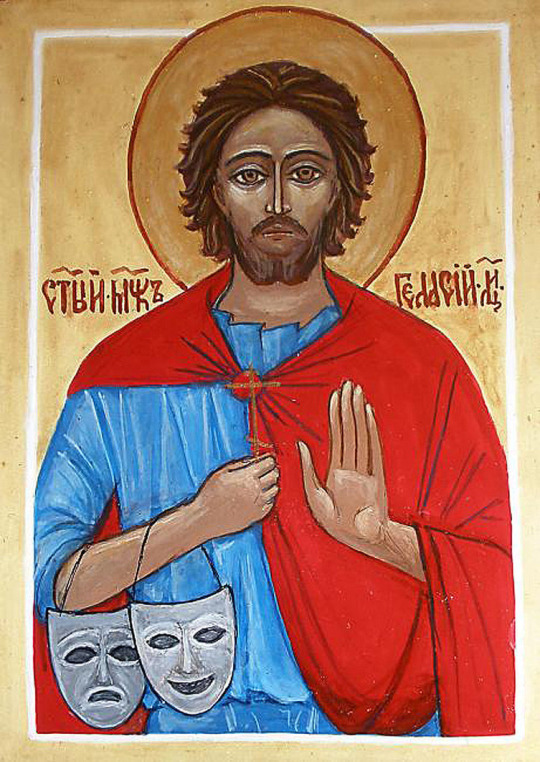
The Holy Martyr Ardalion accepted death for Christ under the emperor Maximian Galerius (305-311). Saint Ardalion was a talented mimic actor.
One time at the circus he played the rolй of a christian. The actor, on the intent of the play-author, was to at first refuse to offer sacrifice to idols, but later to consent to renounce Christ. Along the course of the action they suspended him upon a wooden torture device and tore at him with iron hooks. He so naturally depicted the suffering, that the spectators were delighted and loudly declared their praise of his artistry. Suddenly the saint ordered all to be quiet and declared, that he actually was a Christian and did not renounce the Lord. The governor of the city tried to explain the matter thus, that Saint Ardalion was continuing to play the rolй, and at the end of the show he would renounce Christ and offer sacrifice to the gods. But Saint Ardalion continued to confess his faith in Christ. Then the governor gave orders to throw the martyr onto a red-hot iron-pan. Thus did Saint Ardalion merit a martyr's crown.
all texts© 1996-2001 by translator Fr. S. Janos.
ICON:The Vilensk Icon of the Mother of God

The Vilensk Icon of the Mother of God was written by the holy Evangelist Luke. For a long time it was in the family of the Greek emperors at Constantinople. In 1472 Sophia Paleologa, spouse of the Moscow GreatPrince Ivan III (1462-1505), transferred the icon to Moscow. In 1495 the GreatPrince blessed his daughter Elena with this icon before giving her in marriage to the Lithuanian king Alexander. In honour of the transfer of the icon to Vilna a feast was established 15 February. Later on they placed the holy icon in the John the ForeRunner church, in which princess Elena was buried. And afterwards they transferred the icon to the Vilensk Holy-Trinity monastery.
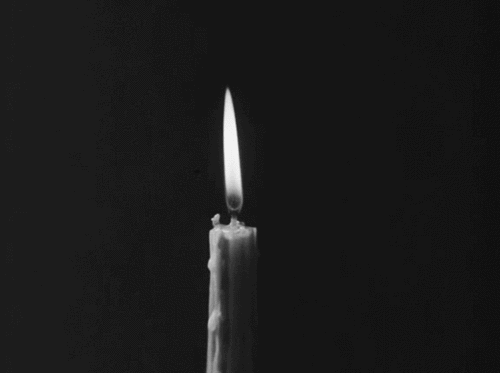
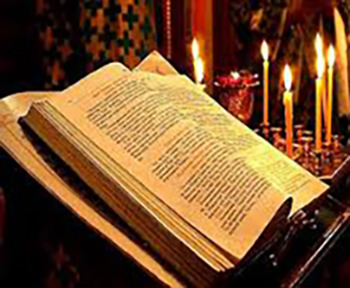
Matthew 24:36-26:2
36 But of that day and hour no one knows, not even the angels of heaven, but My Father only. 37 But as the days of Noah were, so also will the coming of the Son of Man be. 38 For as in the days before the flood, they were eating and drinking, marrying and giving in marriage, until the day that Noah entered the ark, 39 and did not know until the flood came and took them all away, so also will the coming of the Son of Man be. 40 Then two men will be in the field: one will be taken and the other left. 41 Two women will be grinding at the mill: one will be taken and the other left. 42 Watch therefore, for you do not know what hour your Lord is coming. 43 But know this, that if the master of the house had known what hour the thief would come, he would have watched and not allowed his house to be broken into. 44 Therefore you also be ready, for the Son of Man is coming at an hour you do not expect. 45 Who then is a faithful and wise servant, whom his master made ruler over his household, to give them food in due season? 46 Blessed is that servant whom his master, when he comes, will find so doing. 47 Assuredly, I say to you that he will make him ruler over all his goods. 48 But if that evil servant says in his heart, 'My master is delaying his coming,' 49 and begins to beat his fellow servants, and to eat and drink with the drunkards, 50 the master of that servant will come on a day when he is not looking for him and at an hour that he is not aware of, 51 and will cut him in two and appoint him his portion with the hypocrites. There shall be weeping and gnashing of teeth.
1Then the kingdom of heaven shall be likened to ten virgins who took their lamps and went out to meet the bridegroom. 2 Now five of them were wise, and five were foolish. 3 Those who were foolish took their lamps and took no oil with them, 4 but the wise took oil in their vessels with their lamps. 5 But while the bridegroom was delayed, they all slumbered and slept. 6 And at midnight a cry was heard: 'Behold, the bridegroom is coming; go out to meet him!' 7 Then all those virgins arose and trimmed their lamps. 8 And the foolish said to the wise, 'Give us some of your oil, for our lamps are going out.' 9 But the wise answered, saying, 'No, lest there should not be enough for us and you; but go rather to those who sell, and buy for yourselves.' 10 And while they went to buy, the bridegroom came, and those who were ready went in with him to the wedding; and the door was shut. 11 Afterward the other virgins came also, saying, 'Lord, Lord, open to us!' 12 But he answered and said, 'Assuredly, I say to you, I do not know you.' 13 Watch therefore, for you know neither the day nor the hour in which the Son of Man is coming. 14 For the kingdom of heaven is like a man traveling to a far country, who called his own servants and delivered his goods to them. 15 And to one he gave five talents, to another two, and to another one, to each according to his own ability; and immediately he went on a journey. 16 Then he who had received the five talents went and traded with them, and made another five talents. 17 And likewise he who had received two gained two more also. 18 But he who had received one went and dug in the ground, and hid his lord's money. 19 After a long time the lord of those servants came and settled accounts with them. 20 So he who had received five talents came and brought five other talents, saying, 'Lord, you delivered to me five talents; look, I have gained five more talents besides them.' 21 His lord said to him, 'Well done, good and faithful servant; you were faithful over a few things, I will make you ruler over many things. Enter into the joy of your lord.' 22 He also who had received two talents came and said, 'Lord, you delivered to me two talents; look, I have gained two more talents besides them.'23 His lord said to him, 'Well done, good and faithful servant; you have been faithful over a few things, I will make you ruler over many things. Enter into the joy of your lord.' 24 Then he who had received the one talent came and said, 'Lord, I knew you to be a hard man, reaping where you have not sown, and gathering where you have not scattered seed. 25 And I was afraid, and went and hid your talent in the ground. Look, there you have what is yours.' 26 But his lord answered and said to him, 'You wicked and lazy servant, you knew that I reap where I have not sown, and gather where I have not scattered seed. 27 'So you ought to have deposited my money with the bankers, and at my coming I would have received back my own with interest. 28 Therefore take the talent from him, and give it to him who has ten talents. 29 'For to everyone who has, more will be given, and he will have abundance; but from him who does not have, even what he has will be taken away. 30 'And cast the unprofitable servant into the outer darkness. There will be weeping and gnashing of teeth.' 31 When the Son of Man comes in His glory, and all the holy angels with Him, then He will sit on the throne of His glory. 32 All the nations will be gathered before Him, and He will separate them one from another, as a shepherd divides his sheep from the goats. 33 And He will set the sheep on His right hand, but the goats on the left. 34 Then the King will say to those on His right hand, 'Come, you blessed of My Father, inherit the kingdom prepared for you from the foundation of the world: 35 'for I was hungry and you gave Me food; I was thirsty and you gave Me drink; I was a stranger and you took Me in; 36 I was naked and you clothed Me; I was sick and you visited Me; I was in prison and you came to Me.' 37 Then the righteous will answer Him, saying, 'Lord, when did we see You hungry and feed You, or thirsty and give You drink? 38 'When did we see You a stranger and take You in, or naked and clothe You? 39 Or when did we see You sick, or in prison, and come to You? 40 And the King will answer and say to them, 'Assuredly, I say to you, inasmuch as you did it to one of the least of these My brethren, you did it to Me.' 41 Then He will also say to those on the left hand, 'Depart from Me, you cursed, into the everlasting fire prepared for the devil and his angels: 42 'for I was hungry and you gave Me no food; I was thirsty and you gave Me no drink; 43 'I was a stranger and you did not take Me in, naked and you did not clothe Me, sick and in prison and you did not visit Me.'44 Then they also will answer Him, saying, 'Lord, when did we see You hungry or thirsty or a stranger or naked or sick or in prison, and did not minister to You?' 45 Then He will answer them, saying, 'Assuredly, I say to you, inasmuch as you did not do it to one of the least of these, you did not do it to Me.' 46 And these will go away into everlasting punishment, but the righteous into eternal life.
1Now it came to pass, when Jesus had finished all these sayings, that He said to His disciples,2 You know that after two days is the Passover, and the Son of Man will be delivered up to be crucified.
#orthodoxy#orthodoxchristianity#ancientchristianity#originofchristianity#spirituality#holyscriptures#gospel#wisdom
6 notes
·
View notes
Text
Saints&Reading: Tue., Apr., 13, 2021
March 31/April 13
Saint Innocent (Innokentii) (Veniaminov), Metropolitan of Moscow and Kolomensk (1879)

Saint Innocent Veniaminov Equal to the Apostles and Evangelizer of North America John Evseyevich Popov-Veniaminov was born August 8, 1797 in the village of Anginsoye in Irkutsk, Russia. His baptism took place in the local church [1]. His father was a church server, so it was natural that John began reading the Epistle during services at an early age [2]. When John was only six years old, his father died. Four years later, John entered the Irkutsk Theological Seminary. In 1817, he married, was ordained to the diaconate, and was assigned to serve at the Annunciation Church in Irkutsk. After his ordination to the priesthood in 1821, he taught catechism to children while serving the parish as its priest [3]. In 1823, Father John embarked on a great adventure. The Bishop of Irkutsk had been instructed to send a priest to Unalaska in Alaska’s Aleutian Islands. The clergy all refused to go – all, that is, except Father John. In May 1823, he and his wife, their infant son Innocent, and his mother and brother Stefan began the perilous journey. Fourteen months later they arrived on Unalaska Island [4] where he and his family lived in an earthen hut they had constructed themselves. A multi-talented man, he trained a group of local faithful in construction techniques and helped them build Holy Ascension Church, which they completed in 1826 [5]. Father John made numerous missionary journeys around Unalaska and the neighboring Fox and Pribilof Islands. He frequently traveled by dogsled or canoe, his tiny craft buffeted by storms in the Gulf of Alaska [6]. In 1834, he was transferred to New Archangel, later renamed Sitka, where he dedicated himself to ministering to the Tlingits. He studied their language and customs and produced scholarly notes and a dictionary. Among his other journeys was that he undertook in 1836, when he visited Fort Ross north of San Francisco and northern California’s Spanish missions. In 1838, Father John returned to Russia to report on his missionary efforts. While there, he received the sad news that his wife had died. After some time, he decided to enter monastic orders with the name Innocent, in honor of the sainted missionary Bishop of Irkutsk. Two years later, he was consecrated Bishop of Kamchatka and the Kurile Islands and the Aleutian Islands at the Cathedral of the Kazan Icon of the Mother of God in Saint Petersburg [7]. After his return to Alaska as the first resident Bishop in America, Bishop Innocent continued his missionary journeys, during which he proclaimed the Gospel in ways the people could easily understand and remember [8]. During one of his missionary journeys, Bishop Innocent encountered dangerously rough waters off Kodiak Island. Turning in the direction of Spruce Island, where Saint Herman of Alaska lived and was buried, he fervently entreated Saint Herman pray to God for assistance. Within minutes, the waters became calm [9]. His ongoing travels helped him to master local languages and dialects. He also developed alphabets for previously unwritten languages and translated Scripture and other works into Unagan and Yakut [10]. In 1848, Bishop Innocent had the joy of consecrating Saint Michael Cathedral in Sitka, which he used his talents to design and build [11]. The cathedral still serves as the main cathedral for the Diocese of Alaska. In recognition of his exceptional ministry, he was elevated to the dignity of Archbishop in 1850. Archbishop Innocent was elected Metropolitan of Moscow and Kolomna in 1868 [12]. As Metropolitan, he worked diligently to uplift the faithful spiritually and improve the living conditions of the clergy. He fell asleep in the Lord on March 31, 1879 and was buried in the Church of the Holy Spirit at the Trinity-Saint Sergius Lavra in Sergeiv Posad, near Moscow [13]. He was canonized in 1977 by the Church of Russia during the tenure of Patriarch Pimen of Moscow [14].
O Holy Father Innocent, pray to God for us! ■
Source: Orthodox Church of America
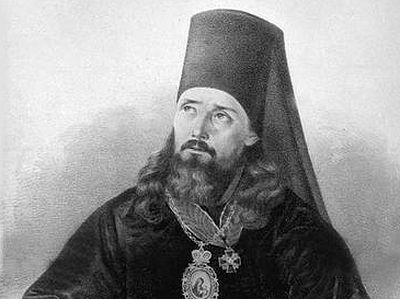
The Priest Martyr Ipatios, Bishop of Gangra,

The PriestMartyr Ipatios, Bishop of Gangra, was bishop of the city of Gangra in Paphlagonia (Asia Minor). In the year 325 he participated in the I OEcumenical Council at Nicea, at which the heresy of Arius was given anathema.
When Saint Ipatios was returning in 326 from Constantinople to Gangra, followers of the schismatics Novatus and Felicissimus fell upon him in a desolate place. The heretics ran him through with swords and spears, and threw him from an high bank into a swamp. Like the First-martyr Arch-deacon Stephen, Saint Ipatios prayed for his murderers. A certain Arian woman struck the saint on the head with a stone, and he died. The murderers hid his body in a cave, where a christian who kept straw there found his body. Recognising the body of the bishop, he hastened to report about this in the city, and the inhabitants of Gangra piously buried the remains of their beloved arch-pastor.
After death the relics of Saint Ipatios won reknown for numerous miracles, in particular the casting out of demons and for healing the sick.
From of old the Priestmartyr Ipatios was particularly venerated in the Russian land. Thus in the year 1330 was built at Kostroma the Ipatiev monastery, on the place of an appearance of the Mother of God with the Pre-eternal Christ-Child and saints that were present – the Apostle Philip and the Priestmartyr Ipatios, bishop of Gangra. This monastery afterwards occupied a significant place in the spiritual and social life of the nation, particularly during the years of the Time of Troubles. The old-time copies of the Vita of the Priestmartyr Ipatios were widely distributed in Russian literature, and one of these entered into the compiling of the Chet'i Minei [Reading Menaion] of Metropolitan Makarii (1542-1564). In this Vita was preserved an account about the appearance of the Saviour to Saint Ipatios on the eve of the martyr's death. The veneration to the saint consists of prayers, words of praise and teaching on the day of his memory. The pious veneration of Sainted Ipatios was also expressed in the liturgical works of Russian authors. During the XIX Century was written a new service to the Priestmartyr Ipatios, distinct from the services written by the Monk Joseph the Studite, contained in the March Menaion.
© 1996-2001 by translator Fr. S. Janos.
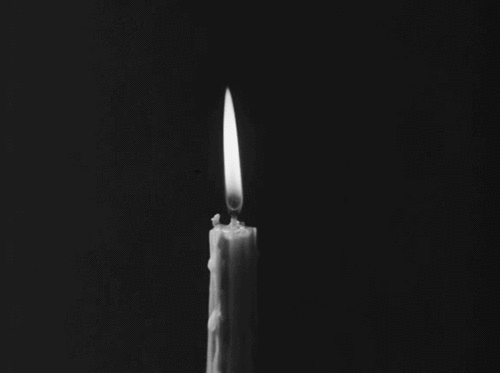

Isaiah 40:18-31
18 To whom then will you liken God? Or what likeness will you compare to Him?
19 The workman molds an image, The goldsmith overspreads it with gold, And the silversmith casts silver chains.
20 Whoever is too impoverished for such a contribution Chooses a tree that will not rot; He seeks for himself a skillful workman To prepare a carved image that will not totter.
21 Have you not known? Have you not heard? Has it not been told you from the beginning? Have you not understood from the foundations of the earth?
22 It is He who sits above the circle of the earth, And its inhabitants are like grasshoppers, Who stretches out the heavens like a curtain, And spreads them out like a tent to dwell in.
23 He brings the princes to nothing; He makes the judges of the earth useless.
24 Scarcely shall they be planted, Scarcely shall they be sown, Scarcely shall their stock take root in the earth, When He will also blow on them, And they will wither, And the whirlwind will take them away like stubble.
25 “To whom then will you liken Me, Or to whom shall I be equal?” says the Holy One.
26 Lift up your eyes on high, And see who has created these things, Who brings out their host by number; He calls them all by name, By the greatness of His might And the strength of His power; Not one is missing.
27 Why do you say, O Jacob, And speak, O Israel: “My way is hidden from the Lord, And my just claim is passed over by my God”?
28 Have you not known? Have you not heard? The everlasting God, the Lord, The Creator of the ends of the earth, Neither faints nor is weary. His understanding is unsearchable.
29 He gives power to the weak, And to those who have no might He increases strength.
30 Even the youths shall faint and be weary, And the young men shall utterly fall,
31 But those who wait on the Lord Shall renew their strength; They shall mount up with wings like eagles, They shall run and not be weary, They shall walk and not faint.
Proverbs 15:7-19
7The lips of the wise disperse knowledge, But the heart of the fool does not do so.
8 The sacrifice of the wicked is an abomination to the Lord, But the prayer of the upright is His delight.
9 The way of the wicked is an abomination to the Lord, But He loves him who follows righteousness.
10 Harsh discipline is for him who forsakes the way, And he who hates correction will die.
11 Hell and Destruction are before the Lord; So how much more the hearts of the sons of men.
12 A scoffer does not love one who corrects him, Nor will he go to the wise.
13 A merry heart makes a cheerful countenance, But by sorrow of the heart the spirit is broken.
14 The heart of him who has understanding seeks knowledge, But the mouth of fools feeds on foolishness.
15 All the days of the afflicted are evil, But he who is of a merry heart has a continual feast.
16 Better is a little with the fear of the Lord, Than great treasure with trouble.
17 Better is a dinner of herbs where love is, Than a fatted calf with hatred.
18 A wrathful man stirs up strife, But he who is slow to anger allays contention.
19 The way of the lazy man is like a hedge of thorns, But the way of the upright is a highway.
#orthodoxy#orthodoxchristian#ancientchristianity#originofchristianity#spirituality#sacred texts#oldtestament#prophets#wisdom
6 notes
·
View notes
Text
Saints&Reading: Sat., Apr., 24, 2021
LAZARUS ATURDAY
by Archbishop Andrei (Rymarenko)
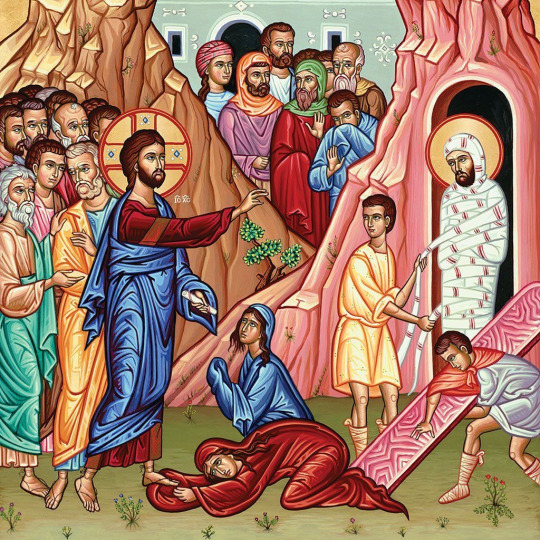
“In the same way we cry to Thee, O Conqueror of death: Hosanna in the highest, blessed is He Who comes in the name of the Lord” (Troparion (hymn) sung on Lazarus Saturday).
Great is this Holy Day, brothers and sisters! Just think of it, “Conqueror of death”! There have been many conquerors in the history of humanity: many gifted doctors have conquered many sicknesses, many military leaders have conquered tremendous armies, even entire countries. There have been conquerors of space such as the inventors of automobiles, airplanes; conquerors of distance — the inventors of the telephone, telegraph, and so on. But “Conqueror of death” — the whole world does not know of anyone else but Jesus Christ. He alone. Even the so-called “unbelieving world” cannot mention another name. No one among the most prominent people would ever even attempt to make such a claim. But He is, was, and will be — our Savior and our Lord.
During His historical evangelistic life He proved this in three instances: the resurrection of the daughter of Jairus, the resurrection of the son of the widow of Nain, and here in today’s Gospel, the resurrection of Lazarus.
The death of the daughter of Jairus was a recent one. She died while Christ and her father were going to her. Even Christ called it slumber; but the people “laughed Him to scorn, knowing that she was dead. And He put them all out, and took her by the hand, and called, saying, Maid, arise! And her spirit came again, and she arose straightway: and He commanded to give her meat” (Lk. 8:53-55).
In the case of the son of the widow of Nain, death, seemingly stronger, came into its own: the dead man had already been laid on the funeral bier. They had carried him not only from the house, but already through the city gates. In order to touch the bier, the Lord had to stop the carriers. And only then did He say, “Young man, I say unto thee, Arise! And he that was dead sat up, and began to speak. And He delivered him to his mother” (Lk. 7:14-15).
And now Lazarus. The victory of death here was final, one hundred percent. Lazarus had been in the tomb four days already. There was weeping, but no one had any hope of an instantaneous resurrection. Even one of the dead man’s sisters said to the Lord: “I know he shall rise again in the resurrection at the last day.” Even the Lord Himself, when He “saw her weeping, and the Jews also weeping which came with her, He groaned in the spirit, and was troubled,” and He wept. Finally He said, “Take ye away the stone.” Here, even the sister of the dead man could not contain herself and said to Him: “Lord, by this time he stinketh: for he hath been dead four days.” So the stone was removed from the tomb where the dead man was lying, and Christ cried with a loud voice, “Lazarus, come forth! And he that was dead came forth bound hand and foot with grave clothes: and his face was bound about with a napkin. Jesus saith unto them, Loose him, and let him go” (Jn. 11:17-44).
Besides physical death, there is mental death. Physical death is visible to everyone, but mental death is usually not noticeable to people. It is felt only by the dead person himself. Bishop Theophan the Recluse said much about this. Sometimes it happens that a sinful thought darts into your mind and awakens a sinful feeling, but the soul catches itself and calls to the Lord in repentance. And the Lord, as with the daughter of Jairus, will as if stretch out His hand and say, “Soul, arise!” And life will return to its joyous flow. But sometimes it happens that we do not catch ourselves in time and sin enters more deeply into our soul (like going out from the house) and the result will be full acceptance of the sin, and turmoil. But also here, by the prayers of our Mother, the Church of Christ, who cries before the Lord for her children, we can be alerted; and the Lord will tell us as He did the son of the widow of Nain: “Soul, I say unto thee, Arise!” This is salvation.
But what shall we do if sin completely enslaves our soul, as if covering it with a tombstone; and so day after day goes by and passions start to exude their sinful stench, just as with Lazarus? What should we do then? Well, then we need confession, the sacrament which Christ established after His Resurrection, when He said to His disciples, “Receive ye the Holy Spirit: Whose so ever sins ye forgive, they are forgiven” (Jn. 20:22-23). See how all this is reflected in the resurrection of Lazarus. Lazarus, on his own, could not go out from the tomb because it was blocked by a stone. He couldn’t even walk, because he was bound hand and foot with funeral bandages. And here Christ said to His disciples, “Loose him.” In application to us, this means that the Lord orders our clergy, who have received in the Sacrament of the Priesthood the gift of the Holy Spirit, to loose our sins. What joy!
And more: death is not the cause but only the result, the consequence of sin. And Christ is, first of all, the Conqueror of sin, and then along with it, the Conqueror of death. So let us triumph: “Hosanna in the highest!”
The Priest Martyr Antipas (92)
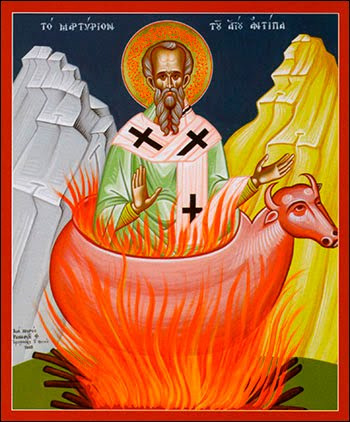
A disciple of the holy Apostle John the Theologian (Comm. 26 September), was bishop of the Church of Pergamum during the reign of the emperor Nero (54-68).
During these times by order of the emperor, everyone who would not offer sacrifice to the idols lived under threat of either exile or execution. And then too on the island of Patmos (in the Aegean Sea) was imprisoned the holy Apostle John the Theologian – he to whom the Lord revealed the future judgements of the world and of Holy Church.
"And to the Angel of the Pergamum Church write: thus sayeth He having the sword sharp of both edges: I do know thine deeds, and that thou dost live there, where doth be the throne of Satan, and that thou dost cleave unto My Name nor didst renounce My faith even in those days, in which My slain faithful witness Antipas was amongst ye, where Satan dwelleth" (Rev. 2: 12-13).
By his personal example, firm faith and constant preaching about Christ, Saint Antipas began to sway the people of Pergamum from offering sacrifice to idols. The pagan priests reproached the bishop for turning the people away from their ancestral gods, and they demanded that he stop preaching about Christ and instead offer sacrifice to the idols.
Saint Antipas calmly answered, that he was not about to serve the demon-gods, which flee before him who was but a mortal man; rather, it is the Lord Almighty that he worships and would continue to worship – the Creator of all, together with His Only‑Begotten and One-in-Essence Son and Holy Spirit. The pagan priests retorted, that their gods existed from of old, whereas Christ was not from of old and was crucified under Pontius Pilate as a criminal. The saint answered, that the pagan gods were the work of human hands and that everything said about them was filled with iniquities and vices. He steadfastly confessed his faith in the Son of God, incarnated of the MostHoly Virgin.
The enraged pagan priests dragged the PriestMartyr Antipas to the temple of Artemis and threw him into a red-hot copper bullock, wherein usually they cast the sacrifices to the idols. In the red-hot furnace the priest-martyr prayed loudly to God, imploring to accept his soul and to fortify Christians in the faith. He expired to the Lord peacefully, as though asleep (+ c. 68).
Christians by night took the body of the PriestMartyr Antipas, untouched by the fire, and with reverence they buried him at Pergamum. The tomb of the priest-martyr became a font of miracles and of healings from manifold sicknesses. Particular recourse to the PriestMartyr Antipas is made during times of tooth-ache.
All translation©1996-2001 by translator Fr. S. Janos.
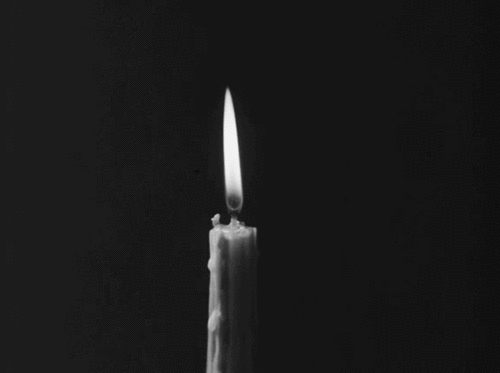
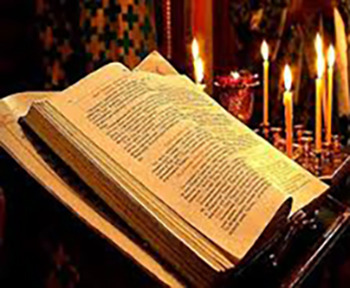
John 11:1-45
1 Now a certain man was sick, Lazarus of Bethany, the town of Mary and her sister Martha. 2 It was that Mary who anointed the Lord with fragrant oil and wiped His feet with her hair, whose brother Lazarus was sick. 3 Therefore the sisters sent to Him, saying, "Lord, behold, he whom You love is sick." 4 When Jesus heard that, He said, "This sickness is not unto death, but for the glory of God, that the Son of God may be glorified through it." 5 Now Jesus loved Martha and her sister and Lazarus. 6 So, when He heard that he was sick, He stayed two more days in the place where He was. 7 Then after this He said to the disciples, "Let us go to Judea again." 8 The disciples said to Him, "Rabbi, lately the Jews sought to stone You, and are You going there again?" 9 Jesus answered, "Are there not twelve hours in the day? If anyone walks in the day, he does not stumble, because he sees the light of this world. 10 But if one walks in the night, he stumbles, because the light is not in him. 11 These things He said, and after that He said to them, "Our friend Lazarus sleeps, but I go that I may wake him up." 12 Then His disciples said, "Lord, if he sleeps he will get well." 13 However, Jesus spoke of his death, but they thought that He was speaking about taking rest in sleep.14 Then Jesus said to them plainly, "Lazarus is dead. 15 And I am glad for your sakes that I was not there, that you may believe. Nevertheless let us go to him. 16 Then Thomas, who is called the Twin, said to his fellow disciples, "Let us also go, that we may die with Him." 17 So when Jesus came, He found that he had already been in the tomb four days. 18 Now Bethany was near Jerusalem, about two miles away. 19 And many of the Jews had joined the women around Martha and Mary, to comfort them concerning their brother. 20 Then Martha, as soon as she heard that Jesus was coming, went and met Him, but Mary was sitting in the house. 21 Now Martha said to Jesus, "Lord, if You had been here, my brother would not have died. 22 But even now I know that whatever You ask of God, God will give You. 23 Jesus said to her, "Your brother will rise again."24 Martha said to Him, "I know that he will rise again in the resurrection at the last day."25 Jesus said to her, "I am the resurrection and the life. He who believes in Me, though he may die, he shall live.26 And whoever lives and believes in Me shall never die. Do you believe this? 27 She said to Him, "Yes, Lord, I believe that You are the Christ, the Son of God, who is to come into the world." 28 And when she had said these things, she went her way and secretly called Mary her sister, saying, "The Teacher has come and is calling for you." 29 As soon as she heard that, she arose quickly and came to Him. 30 Now Jesus had not yet come into the town, but was in the place where Martha met Him. 31 Then the Jews who were with her in the house, and comforting her, when they saw that Mary rose up quickly and went out, followed her, saying, "She is going to the tomb to weep there." 32 Then, when Mary came where Jesus was, and saw Him, she fell down at His feet, saying to Him, "Lord, if You had been here, my brother would not have died." 33 Therefore, when Jesus saw her weeping, and the Jews who came with her weeping, He groaned in the spirit and was troubled. 34 And He said, "Where have you laid him?" They said to Him, "Lord, come and see."35 Jesus wept.36 Then the Jews said, "See how He loved him!" 37 And some of them said, "Could not this Man, who opened the eyes of the blind, also have kept this man from dying?" 38 Then Jesus, again groaning in Himself, came to the tomb. It was a cave, and a stone lay against it. 39 Jesus said, "Take away the stone." Martha, the sister of him who was dead, said to Him, "Lord, by this time there is a stench, for he has been dead four days." 40 Jesus said to her, "Did I not say to you that if you would believe you would see the glory of God?" 41 Then they took away the stone from the place where the dead man was lying. And Jesus lifted up His eyes and said, "Father, I thank You that You have heard Me. 42 And I know that You always hear Me, but because of the people who are standing by I said this, that they may believe that You sent Me.43 Now when He had said these things, He cried with a loud voice, "Lazarus, come forth!"44 And he who had died came out bound hand and foot with graveclothes, and his face was wrapped with a cloth. Jesus said to them, "Loose him, and let him go."45Then many of the Jews who had come to Mary, and had seen the things Jesus did, believed in Him.
Hebrews 12:28-13:8
28 Therefore, since we are receiving a kingdom which cannot be shaken, let us have grace, by which we may serve God acceptably with reverence and godly fear. 29 For our God is a consuming fire.
1 Let brotherly love continue. 2 Do not forget to entertain strangers, for by so doing some have unwittingly entertained angels. 3 Remember the prisoners as if chained with them-those who are mistreated-since you yourselves are in the body also. 4 Marriage is honorable among all, and the bed undefiled; but fornicators and adulterers God will judge. 5 Let your conduct be without covetousness; be content with such things as you have. For He Himself has said, "I will never leave you nor forsake you." 6 So we may boldly say: "The LORD is my helper; I will not fear. What can man do to me?" 7 Remember those who rule over you, who have spoken the word of God to you, whose faith follow, considering the outcome of their conduct. 8 Jesus Christ is the same yesterday, today, and forever.
5 notes
·
View notes
Text
Saints&Reading: Sun., Apr., 11, 2021
4th Sunday of Great Lent
Commemorated on the 4th Sunday of the Great Lent, and March 30
The Monk John of the Ladder

The Monk John of the Ladder (Lestvichnik; Klimatikos; Climaticus) is honoured by Holy Church as a great ascetic and author of the reknown spiritual work called "The Ladder", whereby the monk likewise received the title "of-the-Ladder" [Lestvichnik (Slav.); Klimatikos (Grk.); Climaticus (Lat.)].
About the origins of the monk John there is almost no account preserved. Tradition suggests, that he was born about the year 570, and was the son of Saints Xenophones and Maria, – whose is celebrated by the Church on 26 January. The sixteen year old lad John arrived at the Sinai monastery. Abba Martyrios became instructor and guide of the monk. After four years of living on Sinai, Saint John Lestvichnik was vowed into monasticism. One of those present at the taking of vows, – Abba Stratigios, predicted, that he was set to become a great luminary in the Church of Christ. Over the course of 19 years the monk John pursued asceticism in obedience to his spiritual father. After the death of abba Martyrios the monk John chose an hermit's life, settling into a wild place called Tholos, where he spent 40 years in deeds of silence, fasting, prayer and tears of penitence. It is not by chance that in "The Ladder" the monk John speaks thus about tears of repentance: "Just as fire burns and destroys firewood, so thus do pure tears wash away all impurity, both outer and inner". His holy prayer was strong and efficacious, as evidenced from an example from the life of the God-pleasing saint.
The Monk John had a student, the monk Moses. One time the instructor ordered his student to bring ground to the garden for bedding. Having fulfilled the obedience, the monk Moses lay down to rest under the shade of a large rock, because of the strong heat of summer. The monk John Lestvichnik was at this time in his cell resting after a prayerful labour. Suddenly a man of remarkable appearance appeared to him and, having roused the holy ascetic, said to him in reproach: "Why dost thou, John, rest peacefully here, when Moses is in danger?" The monk John immediately woke up and began to pray for his student. When his disciple returned in the evening, the monk asked, whether some sort of woe had befallen him. The monk answered: "No, but I was exposed to great danger. A large fragment of stone, having broken off from the rock under which I had fallen asleep at mid-day, just barely missed me. By luck, I had a dream that thou wast calling me, and I woke up and started to run off, and at that very moment the huge stone fell with a crash on that very spot, from which I had fled..."
About the manner of life of the monk John is known, that he nourished himself by such as what is not prohibited a fasting life by the ustav, but – in moderation. He did not spend the night without sleep, although he slept not much, only as much as was necessary for keeping up his strength, so that by an unceasing vigilance he would not destroy the mind. "I do not fast excessively, – said he about himself, – nor do I give myself over to intense all-night vigil, nor lay upon the ground, but restrain myself..., and the Lord soon saved me". The following example of humility of the monk John Lestvichnik is noteworthy. Gifted with a deeply penetrating mind, and having become wise by profound spiritual experience, he lovingly received all who came to him so as to guide them to salvation. But when there appeared some who through envy reproached him with loquacity, which they explained away as vanity, the monk John then gave himself over to silence so as not to give cause for blame, and he kept silence for the space of a year. The envious realised their error and they themselves returned to the ascetic with the request not to deprive them of the spiritual profit of his conversation.
Concealing his ascetic deeds from people, the monk John sometimes withdrew into a cave, but accounts of his holiness spread far beyond the locality: incessantly there came to him visitors from every rank and calling, wanting to hear his words of edification and salvation. At age 75, after forty years of ascetic striving in solitude, the monk was chosen as hegumen of the Sinai monastery. For about four years the monk John Lestvichnik governed the holy Sinai monastery. Towards the end of his life, the Lord granted the monk grace-bearing gifts of perspicacity and wonderworking.
During the time of his governing the monastery, – at the request of the hegumen of the Raipha monastery Saint John (Comm. on Cheesefare Saturday), there was written for the monks the reknown "Ladder", – an instruction for rising to spiritual perfection. Knowing about the wisdom and spiritual gifts of the monk, the Raipha hegumen on behalf of all the monks of his monastery requested him to write down for them "a true instruction for those following after invariably, and as such would be a ladder of affirmation, which would lead those wishing it to the Heavenly gates..." The monk John, noted for his humble opinion about himself, was at first perplexed, but afterwards out of obedience he set about fulfilling the request of the Raipha monks. The monk thus also named his work – "The Ladder", and explained the title in the following manner: "I have constructed a ladder of ascent... from the earthly to the holy... in the form of the thirty years of age for the Lord's maturity, symbolically I have constructed a ladder of 30 steps, by which, having attained the Lord's age, we find ourselves with the righteous and secure from falling down". The purpose of this work, is to teach – that the reaching of salvation requires difficult self-denial and demanding ascetic deeds. "The Ladder" presupposes, first, a cleansing from the impurity of sin, the eradication of vices and passions in the old man; second, the restoration in man of the image of God. Although the book was written for monks, any christian living in the world receives from it the hope of guidance for ascent to God, and a support for spiritual life. The Monks Theodore the Studite (Comm. 11 November and 26 January), Sergei of Radonezh (Comm. 25 September and 5 July), Joseph of Volokolamsk (Comm. 9 September and 18 October), and others – in their instructions relied on "The Ladder" as an important book for salvific guidance.
The content of one of the steps of "The Ladder" (the 22nd) discusses the ascetic deed of the destruction of vainglory. The monk John writes: "Vanity springs out in front of each virtue. When, for example, I keep a fast – I am given over to vanity, and when I in concealing the fasting from others permit myself food, I am again given over to vanity – by my prudence. Dressing up in bright clothing, I am vanquished by love of honour and, having changed over into drab clothing – I am overcome by vanity. If I stand up to speak – I fall under the power of vanity. If I wish to keep silence, I am again given over to it. Wherever this thorn comes up, it everywhere stands with its points upwards. It is vainglorious..., on the surface to honour God, and in deed to strive to please people rather than God... People of lofty spirit bear insult placidly and willingly, but to hear praise and feel nothing of pleasure is possible only for the saints and for the unblameworthy... When thou hearest, that thy neighbour or friend either afront the eyes or behind the eyes slandereth thee, praise and love him... Does this not shew humility, and who can reproach himself, and be intolerant with himself? But who, having been discredited by another, would not diminish in his love for him... Whoever is exalted by natural gifts – a felicitous mind, a fine education, reading, pleasant elocution and other similar qualities, which are readily enough acquired, that person might yet never obtain to supernatural gifts. Wherefore whoever is not faithful in the small things, that one also is not faithful in the large, and is vainglorous. It often happens, that God Himself humbles the vainglorious, sending a sudden misfortune... If prayer does not destroy a proud thought, we bring to mind the leaving of the soul from this life. And if this does not help, we threaten it with the shame of the Last Judgement. "Rising up to humble oneself" even here, before the future age. When praisers, or better – flatterers, start to praise us, immediately we betake ourselves to recollection of all our iniquities and we find, that we are not at all worth that which they impute to us".
This and other examples, located in "The Ladder", offer us an image of this saint's zealousness about his own salvation, which is necessary for each person who wishes to live piously. It is a written account of his thought, the collective fruit of many and also of his refined observation from his own soul and his own profound spiritual experience. It reveals itself as a guide and great help on the way to truth and good.
The steps of "The Ladder" – this proceeding from strength to strength on the path of man's proclivity to perfection, is not something suddenly but rather gradually to be reached, as in the saying of the Saviour: "The Kingdom of Heaven is taken by strength, and those utilising strength shalt delight of it" (Mt 11: 12).
© 1996-2001 by translator Fr. S. Janos.
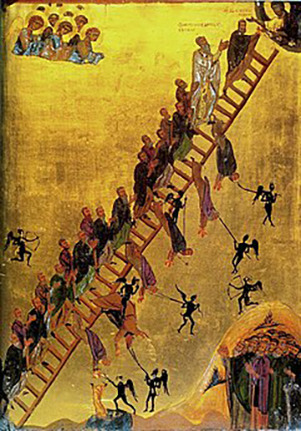
Saint Eustathios the Confessor, Bishop of Bithynia (9th c)
April 11/March29

Saint Eustathios the Confessor, Bishop of Bithynia, was already at the start of his efforts a fervent monk, meek and wise, filled with great faith and love for neighbour. For his virtuous life he was made bishop of the city of Bithynia (a Roman province in north-west Asia Minor) and for many years he guided his flock, giving them example of virtuous life and perfection. During the time of the Iconoclast heresy, Saint Eustathios boldly came out against the heretics in defending the veneration of holy icons. Iconoclast enemies reported against him to the emperor, and the saint suffered imprisonment and fierce beatings. Finally they deprived the holy Bishop Eustathios of his cathedra and sent him off to prison. The holy confessor died during the IX Century in exile, over the course of three years having undergone insults, deprivation, hunger and want.
© 1996-2001 by translator Fr. S. Janos.

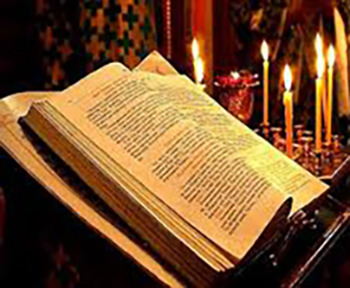
John 21:15-25
15 So when they had eaten breakfast, Jesus said to Simon Peter, "Simon, son of Jonah, do you love Me more than these?" He said to Him, "Yes, Lord; You know that I love You." He said to him, "Feed My lambs." 16 He said to him again a second time, "Simon, son of Jonah, do you love Me?" He said to Him, "Yes, Lord; You know that I love You." He said to him, "Tend My sheep." 17 He said to him the third time, "Simon, son of Jonah, do you love Me?" Peter was grieved because He said to him the third time, "Do you love Me?" And he said to Him, "Lord, You know all things; You know that I love You." Jesus said to him, "Feed My sheep. 18 Most assuredly, I say to you, when you were younger, you girded yourself and walked where you wished; but when you are old, you will stretch out your hands, and another will gird you and carry you where you do not wish." 19 This He spoke, signifying by what death he would glorify God. And when He had spoken this, He said to him, "Follow Me." 20 Then Peter, turning around, saw the disciple whom Jesus loved following, who also had leaned on His breast at the supper, and said, "Lord, who is the one who betrays You?" 21 Peter, seeing him, said to Jesus, "But Lord, what about this man?" 22 Jesus said to him, "If I will that he remain till I come, what is that to you? You follow Me." 23 Then this saying went out among the brethren that this disciple would not die. Yet Jesus did not say to him that he would not die, but, "If I will that he remain till I come, what is that to you?" 24 This is the disciple who testifies of these things, and wrote these things; and we know that his testimony is true. 25 And there are also many other things that Jesus did, which if they were written one by one, I suppose that even the world itself could not contain the books that would be written. Amen.
Ephesians 5:9-19 (
9 (for the fruit of the Spirit is in all goodness, righteousness, and truth), 10finding out what is acceptable to the Lord. 11 And have no fellowship with the unfruitful works of darkness, but rather expose them. 12 For it is shameful even to speak of those things which are done by them in secret. 13 But all things that are exposed are made manifest by the light, for whatever makes manifest is light. 14 Therefore He says: "Awake, you who sleep, Arise from the dead, And Christ will give you light." 15 See then that you walk circumspectly, not as fools but as wise, 16 redeeming the time, because the days are evil. 17 Therefore do not be unwise, but understand what the will of the Lord is. 18 And do not be drunk with wine, in which is dissipation; but be filled with the Spirit, 19 speaking to one another in psalms and hymns and spiritual songs, singing and making melody in your heart to the Lord,
#orthodoxy#orthodox christianity#ancientchristianity#originofchristianity#spirituality#gospel#holyscripture#wisdom#ascetism
6 notes
·
View notes
Text
Saints&Reading: Wed., Feb. 3 2021
Commemorated on January 21, August 13_by the New calendar
The Monk Maximus the Confessor (662)
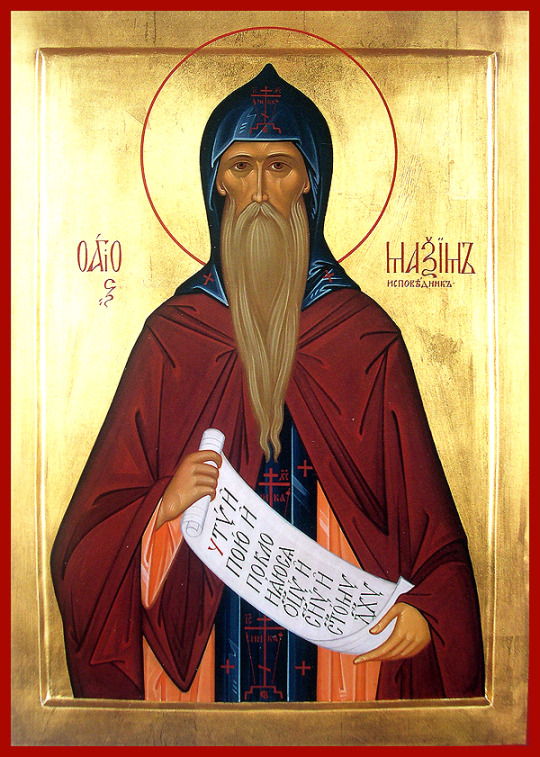
The Monk Maximos the Confessor was born in Constantinople in about the year 580 and raised in a pious Christian family. In his youth he received a very diverse education: he studied philosophy, grammatics, rhetoric, he was well-read in the authors of antiquity and he mastered to perfection theological dialectics. When Saint Maximos entered into government service, the scope of his learning and his conscientiousness enabled him to become first secretary to the emperor Heraclius (611-641). But court life vexed him, and he withdrew to the Chrysopoleia monastery (on the opposite shore of the Bosphorus – now Skutari), where he accepted monastic tonsure. By the humility of his wisdom he soon won the love of the brethren and was chosen hegumen of the monastery, but even in this dignity, in his own words, he "remained a simple monk". But in 633 at the request of a theologian, the future Jerusalem Patriarch Saint Sophronios (Comm. 11 March), the Monk Maximos left the monastery and set off to Alexandria.
Saint Sophronios was known in these times as an implacable antagonist against the Monothelite heresy. The Fourth OEcumenical Council (year 451) had condemned the Monophysite heresy, which confessed in the Lord Jesus Christ only one nature (the Divine, but not the Human nature, of Christ). Influenced by this erroneous tendency of thought, the Monothelite heretics introduced the concept that in Christ there was only "one Divine will" ("thelema") and only "one Divine effectuation or energy" ("energia"), – which sought to lead back by another path to the repudiated Monophysite heresy. Monotheletism found numerous adherents in Armenia, Syria, Egypt. The heresy, fanned also by nationalist animosities, became a serious threat to church unity in the East. The struggle of Orthodoxy with the heresies was particularly complicated by the fact, that in the year 630 three of the Patriarchal thrones in the Orthodox East were occupied by Monothelites: at Constantinople – by Sergios, at Antioch – by Athanasias, and at Alexandria – by Cyrus.
The path of the Monk Maximos from Constantinople to Alexandria led through Crete, where indeed he began his preaching activity. He clashed there with a bishop, who adhered to the heretical opinions of Severus and Nestorius. At Alexandria and its surroundings the monk spent about 6 years. In 638 the emperor Heraclius, together with the patriarch Sergios, attempted to downplay the discrepancies in the confession of faith, and the issued an edict: the so-called "Ecthesis" ("Ekthesis tes pisteos" – "Exposition of Faith), – which ultimately decreed that there be confessed the teaching about "one will" ("mono-thelema") operative under the two natures of the Saviour. In defending Orthodoxy against this "Ecthesis", the Monk Maximos recoursed to people of various vocations and positions, and these conversations had success. "Not only the clergy and all the bishops, but also the people, and all the secular officials felt within themselves some sort of invisible attraction to him, – testifies his Vita.
Towards the end of 638 the patriarch Sergios died, and in 641 – the emperor Heraclius also died. The imperial throne came to be occupied by the cruel and coarse Constans II (642-668), an open adherent of the Monothelites. The assaults of the heretics against Orthodoxy intensified. The Monk Maximos went off to Carthage and he preached there and in its surroundings for about 5 years. When the successor of patriarch Sergios, patriarch Pyrrhos, arrived there in forsaking Constantinople because of court intrigues, and being by persuasion a Monothelite, – there occurred between him and the Monk Maximos an open disputation in June 645. The result of this was that Pyrrhos publicly acknowledged his error and even wanted to put into writing to Pope Theodore the repudiation of his error. The Monk Maximos together with Pyrrhos set off to Rome, where Pope Theodore accepted the repentance of the former patriarch and restored him to his dignity.
In the year 647 the Monk Maximos returned to Africa. And there, at a council of bishops Monotheletism was condemned as an heresy. In the year 648, in place of the "Ecthesis", there was issued a new edict, commissioned by Constans and compiled by the Constantinople patriarch Paul, the "Typus" ("Tupos tes pisteos" – "Pattern of the Faith"), which overall forbade any further deliberations, whether if be about "one will" or about "two wills", as regarding the acknowledged "two natures" of the Lord Jesus Christ. The Monk Maximos thereupon turned to the successor of the Roman Pope Theodore, Pope Martin I (649-654), with a request to examine the question of Monotheletism at a conciliar consideration by all the Church. In October of 649 there was convened the Lateran Council, at which were present 150 Western bishops and 37 representatives of the Orthodox East, amongst which was also the Monk Maximos the Confessor. The Council condemned Monotheletism, and its defenders – the Constantinople patriarchs Sergios, Paul and Pyrrhos, were consigned to anathema.
When Constans II received the determinations of the Council, he gave orders to arrest both Pope Martin and the Monk Maximos. This summons took 5 years to fulfill, in the year 654. They accused the Monk Maximos of treason to the realm and locked him up in prison. In 656 he was sent off to Thrace, and again later brought back to a Constantinople prison. The monk, together with two of his students, was subjected to the cruellest torments: for each they cut out the tongue and cut off the right hand. Then they were sent off to Colchis. But here the Lord worked an inexplicable miracle: all three of them found the ability to speak and to write. The Monk Maximos indeed foretold his own end (+ 13 August 662). On the Greek Saints-Prologue (Calendar), 13 August indicates the Transfer of the Relics of Saint Maximos to Constantinople, but possibly it might apply to the death of the saint. Or otherwise, the establishing of his memory under 21 January may be connected with this – that 13 August celebrates the Leavetaking of the Feast of the Transfiguration of the Lord. Over the grave of the Monk Maximos shone three miraculously-appearing lights, and there occurred many an healing.
The Monk Maximos has left to the Church a large theological legacy. His exegetical works contain explanations of difficult places within the Holy Scripture, also Commentary on the Prayer of the Lord and on the 59th Psalm, various "scholia" ("marginalia" or text-margin commentaries) on treatises of the PriestMartyr Dionysios the Areopagite (+ 96, Comm. 3 October) and Sainted Gregory the Theologian (+ 389, Comm. 25 January). To the exegetical works of Saint Maximos belongs likewise his explication of Divine-services, entitled "Mystagogia" ("Introduction concerning the Mystery").
To the dogmatic works of the Monk Maximos belong: the Exposition on his dispute with Pyrrhos, and several tracts and letters to various people. In them are contained expositions of the Orthodox teaching of the Divine Essence and about Hypostatic-Persons of the Holy Trinity, about the Incarnation of God, and about the "theosis" ("deification", "obozhenie") of human nature.
"Nothing in theosis is the product of human nature, – the Monk Maximos writes in a letter to his friend Thalassios, – since nature cannot comprehend God. It is only but the mercy of God that has the capacity to endow theosis unto the existing... In theosis man (the image of God) becomes likened to God, he rejoices in all the plenitude that does belong to him by nature, since the grace of the Spirit doth triumph within him and because God doth act within him" (Letter 22).
To the Monk Maximos belong also works concerning the anthropologic (i.e. concerning man). He deliberates on the nature of the soul and its consciously-personal existence after the death of a man. Among his moral compositions, especially important is his "Chapters on Love". The Monk Maximos the Confessor wrote likewise three hymns in the finest traditions of church hymnography, following the lead of Saint Gregory the Theologian.
The theology of the Monk Maximos the Confessor, based on the spiritual experience of the knowledge of the great Desert-Fathers, and utilising the skilled art of dialectics worked out by pre-Christian philosophy, was continued and developed upon in the works of the Monk Simeon the New Theologian (+ 1021, Comm. 12 March), and Saint Gregory Palamas (+ c. 1360, Comm. 14 November).
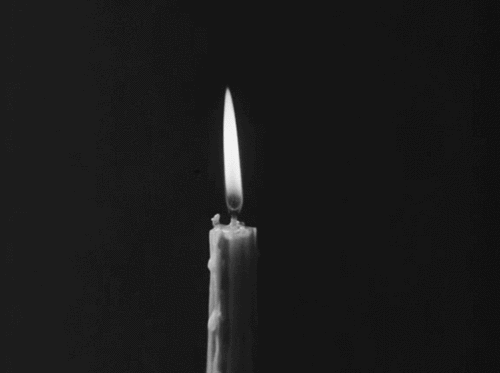
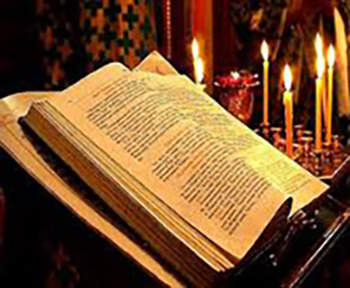
Mark 10:11-16
11So He said to them, "Whoever divorces his wife and marries another commits adultery against her.12And if a woman divorces her husband and marries another, she commits adultery.13Then they brought little children to Him, that He might touch them; but the disciples rebuked those who brought them.14 But when Jesus saw it, He was greatly displeased and said to them, "Let the little children come to Me, and do not forbid them; for of such is the kingdom of God.15Assuredly, I say to you, whoever does not receive the kingdom of God as a little child will by no means enter it. 16 And He took them up in His arms, laid His hands on them, and blessed them.
Galatians 5:22-6:2
22 But the fruit of the Spirit is love, joy, peace, longsuffering, kindness, goodness, faithfulness, 23 gentleness, self-control. Against such there is no law. 24And those who are Christ's have crucified the flesh with its passions and desires. 25 If we live in the Spirit, let us also walk in the Spirit. 26 Let us not become conceited, provoking one another, envying one another.
1 Brethren, if a man is overtaken in any trespass, you who are spiritual restore such a one in a spirit of gentleness, considering yourself lest you also be tempted. 2 Bear one another's burdens, and so fulfill the law of Christ.
#orthodoxy#orthodox christianity#ancientchristianity#originofchristianity#spirituality#holyscriptures#gospel#sacred texts#wisdom
9 notes
·
View notes
Text
Saints&Reading: Tue., Feb. 16, 2021
Commemorated on February 3_by the new calendar
Righteous Simeon the God-Receiver
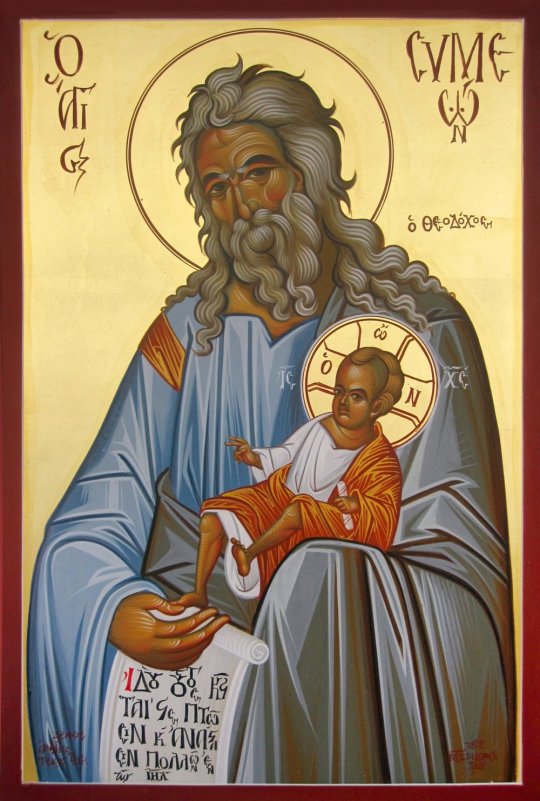
Righteous Simeon the God-Receiver (Bogopriimets) was, according to the testimony of the holy Evangelist Luke, one of the chosen of God in expectation of the consolation of Israel, and the Holy Spirit dwelt upon him (Lk 2:25). It was announced to him from God, that he would not die until that time, when the Promised Messiah – Christ the Lord – would be come into the world.
Ancient historians relate that the Egyptian emperor Ptolemy II Philadelphos (285-247 BC) wished to add to the famous Library at Alexandria with texts of Holy Scripture. He invited scholars from Jerusalem, and the Sanhedrin sent their wise men. Righteous Simeon was also among the 72 scholars in Alexandria for the translation of the Sacred Scriptures into the Greek language. (The work was accomplished and received the title "Translation of the 72 Interpreters". With this also further on in the future, the New Testament was translated into the Slavonic language for the Bulgarian, Serbian and Russian Orthodox Churches.) Righteous Simeon translated a book of the Prophet Isaiah, having read in the original the words: "Behold, a Virgin shalt conceive and give birth to a Son" (Is 7: 14). He decided, that the word "Virgin" was incorrectly used here in place of the word "Woman", and he wanted to correct the text. At that moment an Angel appeared to him and held back his hand saying: "Have faith in the words written down; thou thyself shalt be persuaded that they will be fulfilled, whereof thou shalt not taste of death until thou behold Christ the Lord, Who shall be born of a Pure and Immaculate Virgin".
From this day righteous Simeon began to await the coming of the Promised Messiah. And here one day righteous Simeon, knowing of it by the Holy Spirit, was come to the Jerusalem Temple.
It was on that very same day (the fortieth after the Birth of Christ), when the All-Pure Virgin Mary and Her Betrothed Joseph had come there in order to perform the ritual set down by Jewish Law – to present before the Lord His Own Divine First-Born and to offer the established sacrifice.
When righteous Simeon beheld their arrival, the Holy Spirit revealed to him that the God-Infant Whom the All-Pure Virgin Mary held, – was the Promised Messiah, the Saviour of the world. The elder took into his arms the Infant Christ and pronounced his prophetic words: "Now lettest Thou Thy servant depart, O Lord, with peace according to Thy word, wherefore hath mine eyes beheld Thy salvation, which Thou hast prepared before the face of all peoples, a light to the enlightening of gentiles and the glory of Thy people Israel". He blessed the All-Pure Virgin and Righteous Joseph and, having turned to the Mother of God he said: "Behold, This One is set for the fall and rising up of many in Israel and for the sign spoken against, and for Thee thyself a sword shalt pierce the soul, so that the thoughts of many hearts might be revealed" (Lk 2: 22-35).
Anna the Prophetess
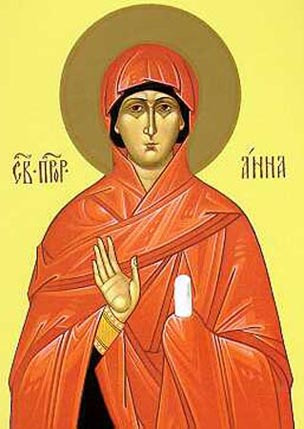
The holy Evangelist relates further: "Here also was Anna the Prophetess, daughter of Phanuel from the tribe of Aser, having reached extreme old age, having lived with her husband for seven years, she was a widow for eighty-four years, who went not out from the temple, serving God both day and night by fasting and prayer. And she having approached at this time, glorified the Lord and prophesied about Him to all awaiting deliverance at Jerusalem" (Lk 2: 36-38).
About the righteous and holy Simeon the God-Receiver is known that he died in extreme old age. In the VI Century his holy relics were transferred to Constantinople. In the year 1200 his grave was seen by the Russian pilgrim Saint Antonii, future archbishop of Novgorod (1212-1220. +1232, Comm. 8 October).
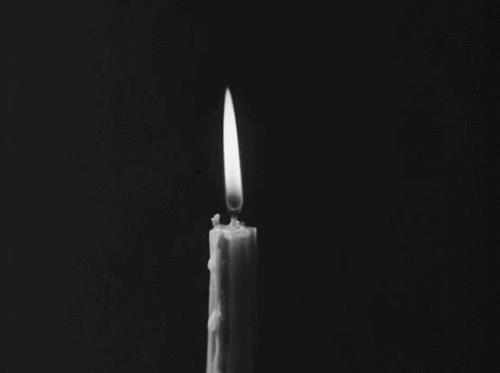
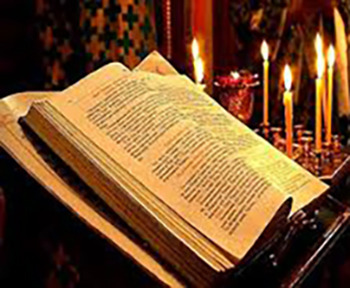
1 Peter 3:10-22
10 For "He who would love life And see good days, Let him refrain his tongue from evil, And his lips from speaking deceit.11Let him turn away from evil and do good; Let him seek peace and pursue it.12 For the eyes of the LORD are on the righteous, And His ears are open to their prayers; But the face of the LORD is against those who do evil."13 And who is he who will harm you if you become followers of what is good?14 But even if you should suffer for righteousness' sake, you are blessed. "And do not be afraid of their threats, nor be troubled."15But sanctify the Lord God in your hearts, and always be ready to give a defense to everyone who asks you a reason for the hope that is in you, with meekness and fear;16 having a good conscience, that when they defame you as evildoers, those who revile your good conduct in Christ may be ashamed.17For it is better, if it is the will of God, to suffer for doing good than for doing evil.18 For Christ also suffered once for sins, the just for the unjust, that He might bring us to God, being put to death in the flesh but made alive by the Spirit,19 by whom also He went and preached to the spirits in prison, 20 who formerly were disobedient, when once the Divine long suffering waited in the days of Noah, while the ark was being prepared, in which a few, that is, eight souls, were saved through water.21 There is also an antitype which now saves us-baptism (not the removal of the filth of the flesh, but the answer of a good conscience toward God), through the resurrection of Jesus Christ,22 who has gone into heaven and is at the right hand of God, angels and authorities and powers having been made subject to Him.
If it seems hard to discern good from evil. Inthis case let us be guided by Christ Himself : 37 Jesus said unto him, Thou shalt love the Lord thy God with all thy bheart, and with all thy soul, and with all thy cmind. 38 This is the first and great commandment. 39 And the second is like unto it, Thou shalt a love thy neighbour as thyself. 40 On these two commandments hang all the law and the prophets. Mat: 22:37-39
Mark 12:13-17
13 Then they sent to Him some of the Pharisees and the Herodians, to catch Him in His words.14 When they had come, they said to Him, "Teacher, we know that You are true, and care about no one; for You do not regard the person of men, but teach the way of God in truth. Is it lawful to pay taxes to Caesar, or not? 15 Shall we pay, or shall we not pay? But He, knowing their hypocrisy, said to them, "Why do you test Me? Bring Me a denarius that I may see it." 16 So they brought it. And He said to them, "Whose image and inscription is this?" They said to Him, "Caesar's." 17 And Jesus answered and said to them, "Render to Caesar the things that are Caesar's, and to God the things that are God's." And they marveled at Him.
#orthodoxy#orthodox christianity#ancientchristianity#originofchristianity#spirituality#holyscripture#gospel#sacredtexts#wisdom
9 notes
·
View notes
Text
Saints&Reading: Sun., Feb. 14, 2021
Forefeast of the Meeting of the Lord
Commemorated on February 1_by the new calendar
The Martyr Tryphon of Campsada near Apamea in Syria (250)
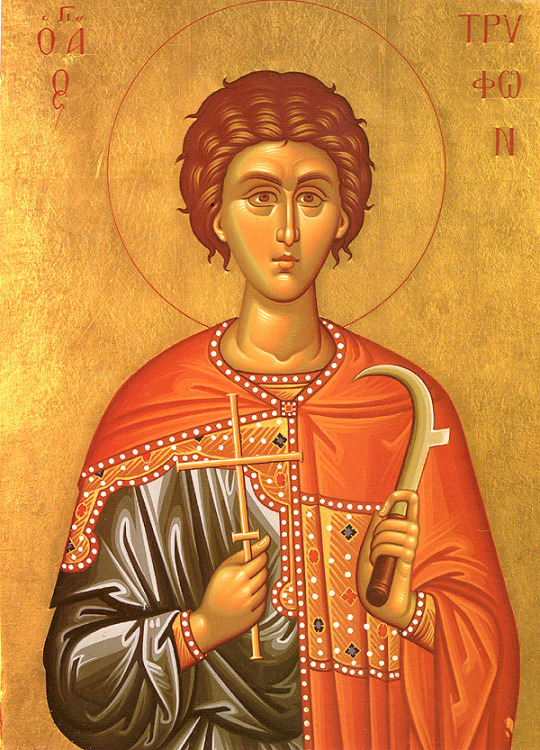
The Martyr Tryphon was born in one of the districts of Asia Minor – Phrygia, not far from the city of Apameia in the village of Kampsada. From his early years the Lord granted him the power to cast out devils and to heal various maladies. The inhabitants of his native city were once saved by him from starvation: Saint Tryphon by the power of his prayer forced back a plague of locusts that were devouring the bread grain and devastating the fields. Saint Tryphon gained particular fame by casting out a devil from the daughter of the Roman emperor Gordian (238-244). Helping everyone in distress, he asked but one fee – faith in Jesus Christ, by Whose grace he healed them.
When the emperor Decius (249-251) entered upon the imperial throne, there was a fierce persecution of Christians. A denunciation was made to the commander Akelinos that Saint Tryphon was bolding preaching faith in Christ and that he led many to Baptism. The saint was arrested and subjected to interrogation, at the time of which he fearlessly confessed his faith. They subjected him to harsh tortures: they beat at him with clubs, lacerated his body with iron hooks, they seared the wounds with fire, and led him through the city, having hammered iron nails into his feet. Saint Tryphon bravely endured all the torments, not giving out a single whimper. Finally, he was condemned to beheading with a sword. The holy martyr prayed before the execution, thanking God for strengthening him in his sufferings, and he besought of the Lord in particular to bless those who should call upon his name for help. Just as the soldiers suspended the sword over the head of the holy martyr, he placed his soul into the hands of God. This event occurred in the city of Nicea in the year 250. Christians wound the holy body of the martyr in a clean shroud and wanted to bury him in the city of Nicea, in which he suffered, but Saint Tryphon in a vision commanded them to take his body to his native land to the village of Kampsada. This was done.
Later on the relics of Saint Tryphon were transferred to Constantinople, and then to Rome. The holy martyr is accorded great veneration in the Russian Orthodox Church.
There exists a legend, that during the reign of tsar Ivan the Terrible at the time of an imperial hunt, a gerfalcon beloved by the tsar flew off. The tsar ordered the falconer Tryphon Patrikeev to find the flown off bird. The falconer Tryphon journeyed about through the surrounding forest, but without luck. On the third day, exhausted by long searching, he returned to Moscow to the place now called Mar'ina Grove, and in weariness he lay down to rest, fervently praying to his patron saint – the Martyr Tryphon, beseeching him for help. In a dream he saw a youth on a white horse, holding on his hand the imperial gerfalcon, and this youth said: "Take back the lost bird, go with God to the tsar and be not aggrieved about it". Having awakened, the falconer actually spotted the gerfalcon not far off on a pine tree. He then took it to the tsar and told about the miraculous help, received by him from the holy Martyr Tryphon. After a certain while the falconer Tryphon Patrikeev built a chapel on the spot where the saint appeared, and later on also there was a church in the name of the holy Martyr Tryphon.
© 1996-2001 by translator Fr. S. Janos.
St. Brigid of Ireland (523)
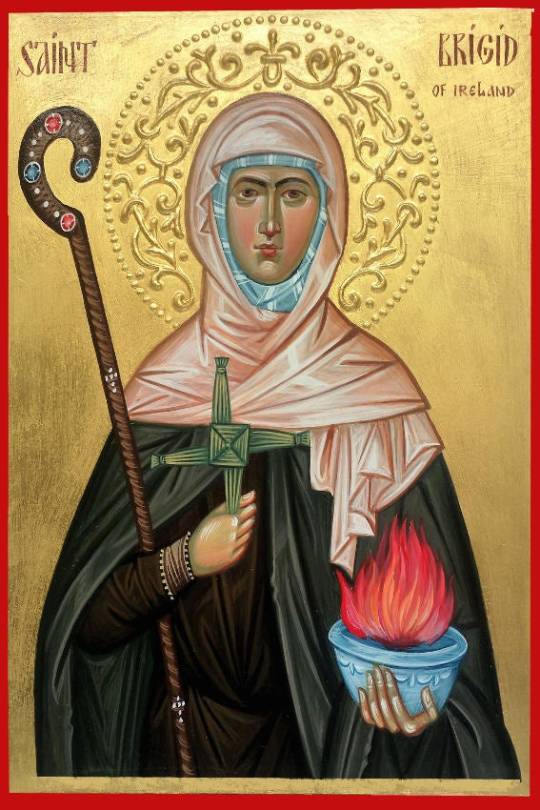
Her name is also spelled Brigit or Bridget; she is considered, equally with St Patrick (March 17), patroness of Ireland. She was born in Ulster of a noble Irish family which had been converted by St Patrick. She was uncommonly beautiful, and her father planned to marry her to the King of Ulster. But at the age of sixteen she asked her Lord Jesus Christ to make her unattractive, so that no one would marry her and she could devote herself to Him alone. Soon she lost an eye and was allowed to enter a monastery. On the day that she took monastic vows, she was miraculously healed and her original beauty restored.
Near Dublin she built herself a cell under an oak tree, which was called Kill-dara, or Cell of the Oak. Soon seven other young women joined her and established the monastery of Kill-dara, which in time became the cathedral city of Kildare. The monastery grew rapidly and became a double monastery with both men's and women's settlements, with the Abbess ranking above the Abbot; from it several other monasteries were planted throughout Ireland. (Combined men's and women's monastic communities are virtually unknown in the east, but were common in the golden age of the Irish Church).
The Saint predicted the day of her death and fell asleep in peace in 524, leaving a monastic Rule to govern all the monasteries under her care. During the Middle Ages her veneration spread throughout Europe.


Luke 19:1-10
1Then Jesus entered and passed through Jericho.2 Now behold, there was a man named Zacchaeus who was a chief tax collector, and he was rich.3 And he sought to see who Jesus was, but could not because of the crowd, for he was of short stature.4 So he ran ahead and climbed up into a sycamore tree to see Him, for He was going to pass that way.5 And when Jesus came to the place, He looked up and saw him, and said to him, "Zacchaeus, make haste and come down, for today I must stay at your house."6 So he made haste and came down, and received Him joyfully. 7 But when they saw it, they all complained, saying, "He has gone to be a guest with a man who is a sinner." 8Then Zacchaeus stood and said to the Lord, "Look, Lord, I give half of my goods to the poor; and if I have taken anything from anyone by false accusation, I restore fourfold."9And Jesus said to him, "Today salvation has come to this house, because he also is a son of Abraham;10for the Son of Man has come to seek and to save that which was lost.
1 Timothy 4:9-15
9This is a faithful saying and worthy of all acceptance.10 For to this end we both labor and suffer reproach, because we trust in the living God, who is the Savior of all men, especially of those who believe. 11 These things command and teach.12 Let no one despise your youth, but be an example to the believers in word, in conduct, in love, in spirit, in faith, in purity. 13 Till I come, give attention to reading, to exhortation, to doctrine.14Do not neglect the gift that is in you, which was given to you by prophecy with the laying on of the hands of the eldership.15 Meditate on these things; give yourself entirely to them, that your progress may be evident to all.
#orthodoxy#orthodox christianity#ancientchristianity#originofchristianity#spirituality#holyscriptures#gospel#sacredtexts#wisdom
8 notes
·
View notes
Text
Saints&Reading: Fri., Apr. 9, 2021
March 27/April 9
The Holy Martyre Matrona of Soluneia (4th c.)
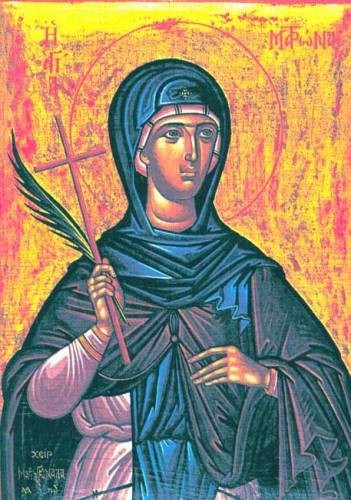
The Holy Martyress Matrona of Soluneia (Thessalonika) suffered in the III or IV Century. She was a slave of the Jewish Pautila, wife of one of the military-commanders of Soluneia. Pautila forced her slave into apostasy and conversion to Judaism, but Saint Matrona, having her faith in Christ since her youthful years, still firmly believed in Christ and went to church secretly unbeknownst to her vengeful mistress.
One time Pautila, having learned that Blessed Matrona had been in church, asked: "Why hast thou not come to our synagogue, but instead did walk to the Christian church?" Saint Matrona boldly answered: "Because in the Christian church God is present, but He is gone away from the Jewish synagogue". Pautila went into a rage and mercilessly beat Saint Matrona, and having tied her shut her into a dark closet. In the morning Pautila discovered, that Saint Matrona had been freed of her bonds by an unknown Power. In a rage Pautila beat the martyress almost to death, then tied her again even more tightly and locked her in the closet, having sealed the door, so that no one might offer help to the sufferer. The holy martyre was there over the course of four days without food or water, and when Pautila opened the door, she again beheld Saint Matrona out of her bonds standing at prayer. In a fierce rage Pautila began to beat the holy martyress with a stout cane and, when the saint was barely breathing, the fierce woman locked her in the room, wherein also the Martyre Matrona gave up her spirit to God.
The body of the holy martyress was thrown from the city wall, by order of Pautila. Christians took up the much-suffered body of the holy martyre and reverently gave it over to burial. And later on, the bishop of Soluneia, Alexander, built a church in the name of the holy martyre, in which they put her holy relics, glorified by miracles.
The judgement of God soon overtook the tormentor Pautila at that very place, where the body of Saint Matrona had been throw from the high wall, – she herself stumbled, fell off it and was smashed, having received her just reward.
© 1996-2001 by translator Fr. S. Janos.
The Monk John the Perspicacious of Egypt (394)
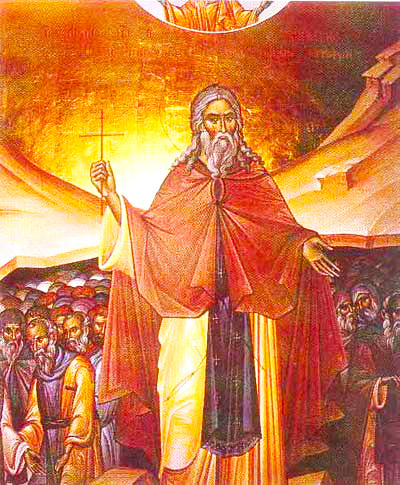
The Monk John the Perspicacious of Egypt was born at the beginning of the IV Century. He lived in the city of Likopolis (Middle Egypt) and was a carpenter. At the age of twenty-five he went off to a monastery, where he accepted monastic tonsure. Over the course of twenty-five years the Monk John asceticised at various monasteries, and then wanting complete solitude, he withdrew into the Thebaid onto Mount Bolcha. Saint John then spent twenty-five years in solitude, never leaving the spot. He conversed with people coming to him through a small aperture, through which he also accepted frugal amounts of food brought him. The Monk John already after thirty years in seclusion was granted by God the graced gift of perspicacious foresight. Thus, he predicted to the emperor Theodosius the Great (379-395) the victory over his adversaries Maximus and Eugenius, and a military victory over the Gauls. For many visiting him he foretold events in their lives and gave them guidance. The holy ascetic distributed blessed oil to the sick visiting him, and anointing with it he healed them from various illness.
The Monk John predicted to the monk Palladios, who wrote down his life, that he would become a bishop. The prediction of the seer was fulfilled, and Palladios was made bishop of Bithynia (Asia Minor).
The Monk John in his directives commanded first of all to have humility: "Imitate in the measure of your strength the virtuous life of the holy fathers and, if ye fulfill everything, then hope not upon yourself nor praise yourself. For there are many such people, which, having reached perfection in virtue and becoming puffed up with pride, plunge from the heights into the abyss. Observe carefully: is your prayer fervent? your purity of heart not transgressed? your mind undisturbed by extraneous thoughts during time of prayer? observe, do you reject the world with all your soul? or go about to spy out the virtues of others, in vain then with your own particular virtues? Are ye concerned to put forth your good example before other people? Take heed, art ye become conceited in your own righteousness, puffed up with pride somehow by your good deed? Take heed, that during time of prayer thoughts about worldly things do not enter your head, since there is nothing more silly, than to converse with the lips to God, while in thought to be far off from Him. This often happens with those, which not so much renounce the world, as rather that they are concerned to comply with the world. A man, thinking about many things, is given over to cares about things worldly and perishable, but being subjected to concern about things worldly, a man cannot yet with his spiritual eyes behold God. For a man, meditating always about God, extraneous thoughts ought to be all in vain. For this man, who has attained to a certain knowledge of God (full knowledge of God no one can attain to), the mysteries of God are revealed to him, and he sees the future as the present, and like a saint he works miracles and receives through his prayer everything that he beseeches of God...
Love silence, child, dwelling always in Divine-meditation and praying God always, that He grant you a pure mind, free from sinful thoughts. Worthy of praise certainly is that ascetic who, living in the world, practises the virtues, rendering kindliness to strangers or distributing alms, or aiding in the work of others, or dwelling constantly without anger. Such a man is praiseworthy, since he dwelleth in virtue, fulfilling the commands of God, while yet not leaving off from earthly affairs. But better than this and more worthy of praise would be that one who, dwelling constantly in Divine-meditation, would ascend from the corporeal to the incorporeal, letting go of the care and concern of others, himself striving towards the Heavenly, constantly standing before God, having relinquished everything worldly and being not still attached to the world by earthly cares. Such a man is in proximity to God, Whom he doth glorify in prayers and psalmody".
With these and similar salvific instructions, and with directive discourse and example of like-angelic life, the monk brought much spiritual benefit to people.
The Monk John of Egypt survived into old age and expired to the Lord in the year 395, at the age of ninety.
© 1996-2001 by translator Fr. S. Janos.
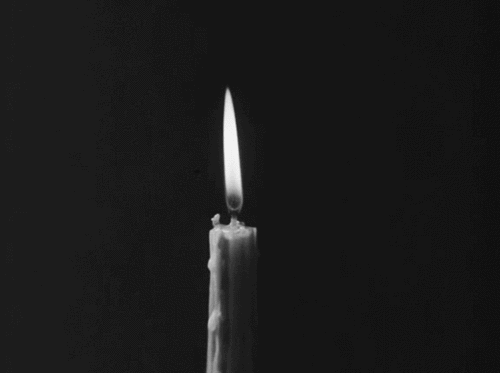
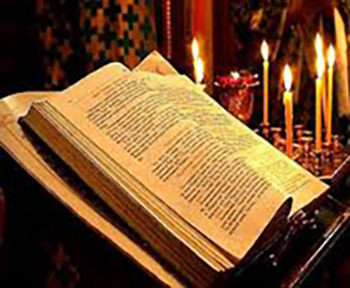
Isaiah 29:13-23
13 Therefore the Lord said: “Inasmuch as these people draw near with their mouths And honor Me with their lips, But have removed their hearts far from Me, And their fear toward Me is taught by the commandment of men,
14 Therefore, behold, I will again do a marvelous work Among this people, A marvelous work and a wonder; For the wisdom of their wise men shall perish, And the understanding of their prudent men shall be hidden.”
15 Woe to those who seek deep to hide their counsel far from the Lord, And their works are in the dark; They say, “Who sees us?” and, “Who knows us?”
16 Surely you have things turned around! Shall the potter be esteemed as the clay; For shall the thing made say of him who made it, “He did not make me”? Or shall the thing formed say of him who formed it, “He has no understanding”?
17 Is it not yet a very little while Till Lebanon shall be turned into a fruitful field, And the fruitful field be esteemed as a forest?
18 In that day the deaf shall hear the words of the book, And the eyes of the blind shall see out of obscurity and out of darkness.
19 The humble also shall increase their joy in the Lord, And the poor among men shall rejoice In the Holy One of Israel.
20 For the terrible one is brought to nothing, The scornful one is consumed, And all who watch for iniquity are cut off—
21 Who make a man an offender by a word, And lay a snare for him who reproves in the gate, And turn aside the just by empty words.
22 Therefore thus says the Lord, who redeemed Abraham, concerning the house of Jacob: “Jacob shall not now be ashamed, Nor shall his face now grow pale;
23 But when he sees his children, The work of My hands, in his midst, They will hallow My name, And hallow the Holy One of Jacob, And fear the God of Israel.
Proverbs 14:15-26
15The simple believes every word, But the prudent considers well his steps.
16 A wise man fears and departs from evil, But a fool rages and is self-confident.
17 A quick-tempered man acts foolishly, And a man of wicked intentions is hated.
18 The simple inherit folly, But the prudent are crowned with knowledge.
19 The evil will bow before the good, And the wicked at the gates of the righteous.
20 The poor man is hated even by his own neighbor, But the rich has many friends.
21 He who despises his neighbor sins;
22 Do they not go astray who devise evil? But mercy and truth belong to those who devise good.
23 In all labor there is profit, But idle chatter leads only to poverty.
24 The crown of the wise is their riches, But the foolishness of fools is folly.
25 A true witness delivers souls, But a deceitful witness speaks lies.
26 In the fear of the Lord there is strong confidence, And His children will have a place of refuge.
#orthodoxy#orthodoxchristianity#ancientchristianity#originofchristianity#spirituality#sacredtexts#oldtestament#wisdom
6 notes
·
View notes